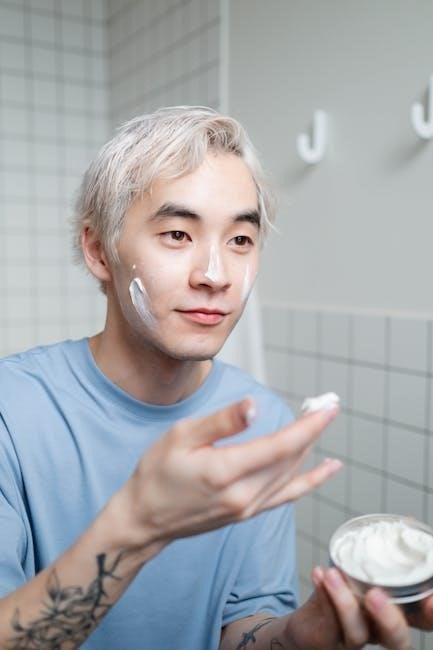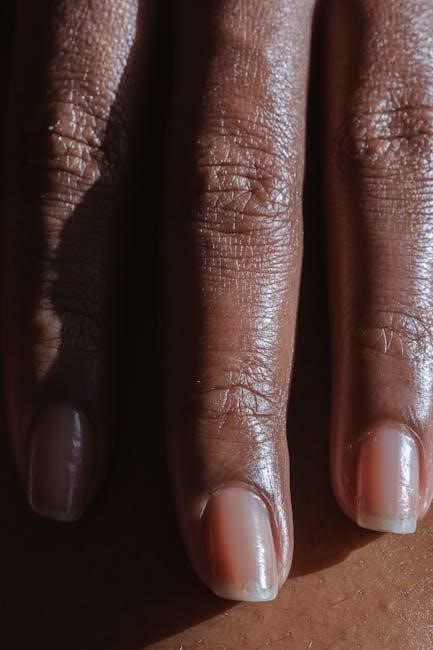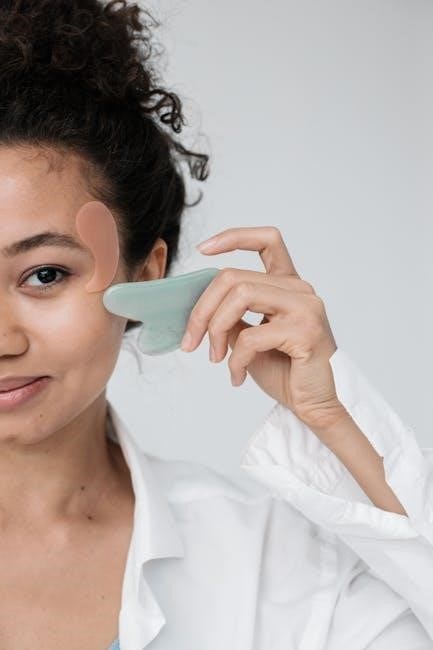Dorothea Orem’s Self-Care Theory emphasizes individuals’ ability to perform self-care activities to maintain health and well-being. It provides a framework for nurses to identify when assistance is needed, focusing on promoting independence and addressing deficits in self-care capabilities. This theory is foundational in nursing practice, education, and research, offering a systematic approach to understanding and addressing patient needs.
1.1 Overview of the Self-Care Deficit Nursing Theory (SCDNT)
Dorothea Orem’s Self-Care Deficit Nursing Theory (SCDNT) proposes that individuals have the capacity for self-care, which is essential for maintaining health and well-being. The theory identifies situations where self-care deficits arise due to limitations in a person’s ability to perform self-care activities. It emphasizes the role of nursing in addressing these deficits by designing interventions that support or perform self-care. SCDNT is composed of three interrelated theories: the Theory of Self-Care, the Theory of Self-Care Deficit, and the Theory of Nursing Systems. Together, they provide a framework for nurses to assess, plan, and implement care that promotes health and prevents illness.
1.2 Historical Context and Development of the Theory
Dorothea Orem began developing her Self-Care Deficit Nursing Theory (SCDNT) in the 1950s, influenced by her extensive nursing experience and observations of patient care. She formally introduced the theory in her 1971 book, Nursing: Concepts of Practice. The theory emerged during a time when nursing sought to define its unique role in healthcare. Orem’s work was groundbreaking, as it emphasized the patient’s ability to care for themselves and the nurse’s role in addressing deficits. The theory has since evolved, with revisions in 1985 and 1995, solidifying its place as a foundational framework in nursing practice and education.
1.3 Importance of Self-Care in Nursing Practice
The concept of self-care is fundamental to nursing practice, as it empowers patients to take an active role in their health management. By fostering self-care abilities, nurses promote health, prevent illnesses, and enhance quality of life. Self-care practices address physical, psychological, and social needs, enabling individuals to maintain independence and dignity. This approach reduces healthcare costs and improves patient outcomes. Orem’s theory emphasizes the nurse’s role in guiding and supporting patients to meet their self-care needs, creating a collaborative relationship that prioritizes patient autonomy and holistic care.

Key Concepts and Definitions
Dorothea Orem’s Self-Care Theory revolves around self-care, self-care deficit, and nursing systems. These concepts define how individuals maintain health and how nurses assist when self-care abilities are inadequate.
2.1 Self-Care and Self-Care Deficit
Dorothea Orem defines self-care as deliberate actions individuals take to maintain their health and well-being. A self-care deficit occurs when a person cannot perform these activities, requiring nursing intervention. Self-care involves physical, psychological, and social aspects, while deficits arise from limitations in knowledge, skills, or physical capabilities. Orem emphasizes that nurses must identify these deficits to provide appropriate support, fostering independence and health promotion.
2.2 Nursing Systems and Their Role in Self-Care
Nursing systems, as defined by Orem, are structured actions nurses take to help patients meet self-care needs. These systems are tailored to the patient’s unique situation and may be wholly compensatory, partially compensatory, or supportive-educative. Wholly compensatory systems involve nurses performing care when patients cannot. Partially compensatory systems assist patients in performing self-care. Supportive-educative systems focus on teaching and enabling patients to care for themselves. Nursing systems aim to address self-care deficits, promote health, and prevent illness, aligning with Orem’s emphasis on patient autonomy and independence.
2.3 Therapeutic Self-Care Demand
Therapeutic self-care demand refers to the specific actions individuals must perform to maintain health and well-being, particularly during illness or disability. It encompasses the physical, emotional, and social activities required to address health-related needs. Nurses assess these demands to identify deficits and develop care plans. Orem emphasizes that therapeutic self-care demand is dynamic, varying with the individual’s condition, environment, and life circumstances. Understanding this concept enables nurses to tailor interventions, ensuring patients receive the support needed to meet their unique self-care requirements and promote optimal health outcomes. This aligns with Orem’s focus on empowering patients to take an active role in their care.

Theoretical Framework
Orem’s theory is built on three interconnected theories: self-care, self-care deficit, and nursing systems. Together, they provide a comprehensive framework for addressing self-care deficits in nursing practice.
3.1 Theory of Self-Care
Dorothea Orem’s Theory of Self-Care defines it as deliberate actions individuals take to maintain their health and well-being. It emphasizes the importance of self-care in promoting health, preventing illness, and managing conditions. Self-care involves activities like eating, exercising, and hygiene, which individuals perform independently or with assistance. Orem asserts that self-care is a learned behavior influenced by factors such as age, health, and environment. The theory underscores the role of nursing in supporting and enhancing these abilities, particularly when individuals cannot meet their own needs. This framework highlights self-care as a cornerstone of health promotion and disease management.
3.2 Theory of Self-Care Deficit
Orem’s Theory of Self-Care Deficit explains situations where individuals cannot fulfill their self-care needs, requiring nursing intervention. A self-care deficit arises when personal self-care abilities are insufficient to meet health demands. Nurses assess deficits by comparing self-care needs with existing abilities. Interventions aim to bridge gaps, fostering independence and health outcomes. This theory guides nurses to design care plans tailored to patients’ specific deficits, ensuring personalized support. It emphasizes collaboration, enabling patients to regain or maintain self-care capabilities over time. Addressing deficits promotes health, prevents complications, and enhances overall well-being. This framework is essential for effective, patient-centered nursing care.
3;3 Theory of Nursing Systems
Orem’s Theory of Nursing Systems describes the structures and processes nurses use to help patients meet their self-care needs. It outlines three nursing systems: wholly compensatory, partly compensatory, and supportive-educative. Wholly compensatory systems provide total care when patients cannot care for themselves. Partly compensatory systems assist patients with specific tasks they cannot perform. Supportive-educative systems focus on teaching patients self-care skills. Nursing systems are tailored to individual needs, ensuring effective care. This theory emphasizes the nurse’s role in designing and implementing care that promotes health, reduces deficits, and fosters patient independence. It provides a framework for delivering personalized, goal-oriented nursing interventions.

Assumptions of Orem’s Self-Care Theory
Orem’s theory assumes humans have the capacity for self-care, nursing is needed when self-care deficits exist, and nursing enhances health and well-being.
4.1 Assumptions About Human Beings and Health

Orem’s theory assumes humans possess the capacity for self-care, with health defined as a state of well-being enabling individuals to meet their needs and participate in life. It presumes people can learn, grow, and make decisions about their health. Health is viewed as a dynamic process, influenced by physical, psychological, and social factors. Individuals are capable of initiating actions to maintain or improve their health, and self-care is essential for preventing illness and promoting overall well-being. These assumptions emphasize the intrinsic value of human dignity and the potential for personal responsibility in health management.
4.2 Assumptions About Nursing and Self-Care
Orem’s theory assumes nursing is a unique service aimed at helping individuals meet their self-care needs. Nurses are viewed as enablers who provide the knowledge, skills, and support necessary for self-care. It is assumed that individuals have the desire and capacity to care for themselves, with nursing acting as a catalyst. Effective nursing enables individuals to perform self-care independently, promoting health, well-being, and life satisfaction. These assumptions underscore the collaborative nature of the nurse-patient relationship, focusing on empowerment rather than dependency.
4.3 Assumptions About the Nurse-Patient Relationship
Orem’s theory assumes the nurse-patient relationship is collaborative and goal-oriented. Nurses are seen as partners who empower patients to achieve self-care. The relationship is built on mutual respect, trust, and open communication. It is assumed that patients are capable of learning and performing self-care activities with appropriate guidance. Nurses act as educators, supporters, and advocates, tailoring interventions to individual needs. This relationship fosters autonomy, responsibility, and confidence in patients, enabling them to manage their health effectively. The nurse’s role is to facilitate, not dictate, ensuring patients feel empowered and engaged in their care.

Application of the Theory in Nursing Practice
Orem’s theory guides nurses in assessing self-care needs, identifying deficits, and developing personalized care plans. It emphasizes patient education and empowerment to enhance well-being and reduce dependency.
5.1 Assessing Self-Care Needs and Abilities
Assessing self-care needs and abilities involves evaluating a patient’s physical, psychological, and social capabilities to perform self-care activities. Nurses use observations, interviews, and standardized tools to identify strengths and limitations. This step ensures care plans align with the patient’s health condition, lifestyle, and personal circumstances, fostering independence and addressing deficits. Orem’s theory emphasizes understanding universal, developmental, and health deviation self-care needs to provide targeted interventions. Accurate assessment is crucial for effective care planning and promoting optimal health outcomes. It also enables nurses to prioritize education and support, empowering patients to manage their care effectively.
5.2 Identifying Self-Care Deficits
Identifying self-care deficits involves determining gaps between a patient’s current self-care abilities and the self-care demands of their health condition. Nurses assess physical, emotional, and cognitive limitations that hinder self-care. This step uses observations, patient reports, and clinical data to pinpoint deficits. Tools like questionnaires or checklists may aid in identifying these gaps. Deficits often arise from inadequate knowledge, physical impairments, or emotional barriers. Accurate identification ensures targeted nursing interventions, addressing specific needs and promoting health outcomes. It also guides the development of personalized care plans to bridge these gaps and enhance the patient’s ability to perform self-care activities effectively.
5.3 Planning and Implementing Nursing Interventions
Planning and implementing nursing interventions is a critical step in addressing self-care deficits. Nurses develop individualized care plans based on the patient’s specific needs, abilities, and health goals. Interventions are designed to bridge gaps in self-care capabilities, ensuring the patient can meet therapeutic demands. This may involve educating patients, providing support, or using assistive devices. Nurses select appropriate nursing systems—wholly compensatory, partially compensatory, or supportive-educative—to guide care delivery. The plan is implemented collaboratively, empowering patients to assume responsibility for their care. Continuous assessment and adjustments ensure interventions remain effective and aligned with the patient’s evolving needs, fostering independence and health outcomes.
5.4 Evaluating Outcomes of Nursing Care
Evaluating outcomes of nursing care is essential to ensure the effectiveness of interventions and the patient’s progress toward self-care goals. Nurses assess whether self-care deficits have been addressed and whether the patient’s abilities to perform self-care activities have improved. Outcomes are measured against established goals, focusing on the patient’s independence, health status, and quality of life. The evaluation process involves monitoring, documenting, and interpreting the patient’s responses to care. This step ensures that nursing interventions are adjusted as needed to promote optimal outcomes and support the patient’s continued ability to meet their therapeutic self-care demands.

Practical Examples and Case Studies
Orem’s theory is applied in managing chronic diseases, rehabilitation, and long-term care. Case studies include self-care education for hypertension patients, emphasizing lifestyle modifications and monitoring techniques.
6.1 Application in Chronic Disease Management
Orem’s Self-Care Theory is widely applied in managing chronic diseases like diabetes, heart disease, and asthma. Nurses use the theory to assess patients’ self-care abilities and identify deficits. Personalized interventions are developed to enhance self-care practices, such as adherence to medication, dietary modifications, and regular physical activity. The theory emphasizes education and empowerment, enabling patients to manage their conditions effectively. By fostering independence, nurses reduce hospital readmissions and improve long-term health outcomes, aligning with the theory’s focus on promoting health and preventing complications.
6.2 Use in Rehabilitation and Long-Term Care
Orem’s Self-Care Theory is valuable in rehabilitation and long-term care settings, where patients often require assistance with daily living activities. Nurses assess patients’ self-care abilities and design interventions to promote independence. For example, in rehabilitation, nurses may focus on relearning skills like bathing or dressing. In long-term care, the theory helps address ongoing needs, such as managing incontinence or mobility issues. By fostering self-care, nurses empower patients to maintain dignity and functionality, reducing reliance on caregivers. This approach aligns with the theory’s goal of enhancing health outcomes through tailored, patient-centered care.
6.3 Case Study: Self-Care Education for Patients with Hypertension
A 55-year-old patient with uncontrolled hypertension was admitted for management. Using Orem’s theory, the nurse assessed the patient’s self-care deficits, focusing on diet, exercise, and medication adherence. The patient lacked knowledge about sodium restriction and blood pressure monitoring. The nurse provided tailored education, demonstrating how to track blood pressure and prepare low-sodium meals. The patient was encouraged to walk daily and maintain a log. Post-intervention, the patient showed improved blood pressure control and increased confidence in managing hypertension. This case highlights how Orem’s theory enables nurses to empower patients with chronic conditions through targeted self-care education.

Strengths and Limitations of the Theory
Orem’s theory is praised for its comprehensive framework and emphasis on patient autonomy but criticized for its complexity and lack of empirical validation in diverse settings.
7.1 Strengths: Utility in Diverse Nursing Settings
Orem’s Self-Care Theory is highly adaptable, making it applicable across various nursing settings, from acute care to community and long-term care. Its universal concepts, such as self-care deficits and therapeutic demands, enable nurses to address diverse patient needs. The theory’s flexibility allows it to be tailored to individuals with chronic illnesses, disabilities, or acute conditions. It empowers patients by fostering independence and health promotion, aligning with holistic nursing practices. This versatility enhances its relevance in global healthcare, making it a valuable framework for nurses worldwide to deliver personalized, patient-centered care.
7.2 Limitations: Complexity and Scope of the Theory
Orem’s Self-Care Theory is criticized for its complexity and broad scope, which can make it challenging to fully grasp and apply in practice. The theory’s extensive framework, including multiple concepts and definitions, may overwhelm nurses, particularly those new to nursing. Additionally, its focus on universal self-care needs can lack depth in addressing specific, nuanced patient situations. The terminology and abstract nature of the theory may also create barriers to understanding and implementation. Despite its strengths, these limitations highlight the need for simplification and practical guidance to enhance its usability in diverse clinical settings.
7.3 Opportunities for Theory Refinement
Orem’s Self-Care Theory offers opportunities for refinement to enhance its relevance and applicability in modern healthcare. Expanding the theory to address digital health tools, such as mobile apps and telehealth, could improve self-care outcomes. Incorporating cultural and individual differences in self-care practices would make the theory more adaptable globally. Simplifying the framework and providing practical guidelines could ease implementation. Additionally, integrating the theory with other nursing models may strengthen its utility. These refinements would ensure the theory remains a valuable resource in addressing evolving patient needs and advancing nursing practice.

Relevance in Contemporary Nursing
Orem’s Self-Care Theory remains highly relevant in modern nursing, emphasizing patient-centered care, empowerment, and health promotion. It aligns with current focuses on chronic disease management and personalized care.
8.1 Alignment with Global Self-Care Movements
Dorothea Orem’s Self-Care Theory aligns with global self-care movements by promoting health empowerment and personal responsibility. It complements initiatives like the World Health Organization’s (WHO) self-care strategies, which emphasize individuals’ roles in managing their health. Orem’s framework supports global goals by providing a structured approach to self-care, enabling individuals to maintain health and prevent illnesses. This alignment is particularly relevant in addressing chronic diseases and mental health, where self-care practices are essential. The theory’s focus on personalized care resonates with modern healthcare’s shift toward patient-centered and sustainable health systems.
8.2 Interprofessional Collaboration in Healthcare
Dorothea Orem’s Self-Care Theory promotes interprofessional collaboration by emphasizing the importance of teamwork in supporting patients’ self-care abilities. Nurses, physicians, therapists, and other healthcare professionals work together to create personalized care plans that align with patients’ needs and goals. This collaborative approach ensures comprehensive and coordinated care, addressing the whole person—physically, emotionally, and socially. By integrating diverse expertise, healthcare teams can enhance patient outcomes and foster a supportive environment for self-care practices. Orem’s framework underscores the value of communication and shared responsibilities among professionals to achieve optimal and effective health results.
8.3 Role in Nursing Education and Research
Dorothea Orem’s Self-Care Theory significantly influences nursing education by providing a foundational framework for teaching self-care principles and practices. It guides curriculum development, enabling students to understand the importance of promoting patients’ autonomy and self-care abilities. In research, the theory offers a structured approach for investigating self-care interventions, their effectiveness, and their impact on health outcomes. By fostering evidence-based practice, Orem’s theory encourages nurses to explore innovative ways to address self-care deficits, advancing the field of nursing and improving patient care. Its clarity and applicability make it a valuable tool for both educators and researchers.

Future Directions and Evolution
Orem’s theory will evolve by integrating technology, cultural adaptations, and global health trends, ensuring its relevance in modern nursing and self-care practices worldwide.
9.1 Integration with Emerging Healthcare Trends
Dorothea Orem’s Self-Care Theory aligns with modern healthcare trends like telehealth, AI-driven personalized care, and preventive medicine. By incorporating these advancements, nurses can enhance self-care education and monitoring, improving patient outcomes. Digital tools enable real-time tracking of self-care behaviors, fostering better adherence to treatment plans. This integration supports chronic disease management and empowers patients to take greater control of their health. It also addresses health disparities by expanding access to self-care resources. As healthcare evolves, Orem’s theory remains foundational, guiding innovative approaches to patient-centered care and holistic well-being in diverse clinical settings.
9.2 Expanding Self-Care Concepts in Digital Health
Dorothea Orem’s Self-Care Theory is being reimagined through digital health innovations. Mobile apps, wearable devices, and telehealth platforms now enable patients to monitor and manage their health, aligning with Orem’s emphasis on self-care agency. These tools provide personalized interventions, such as medication reminders and lifestyle coaching, fostering independence and health literacy. Telehealth allows nurses to guide patients remotely, reinforcing self-care practices. Digital health solutions also address disparities by increasing access to care. By integrating Orem’s principles into digital platforms, nurses can empower patients to take charge of their well-being, bridging the gap between traditional care and modern technology.
9.3 Global Adaptations and Cultural Considerations
Dorothea Orem’s Self-Care Theory has been adapted globally to accommodate diverse cultural values and healthcare practices. In collectivist cultures, family-centered care is emphasized, aligning with Orem’s focus on self-care deficits. In Japan, the theory is used to promote independence in aging populations, while in India, it integrates with traditional healing practices. Nurses must consider cultural beliefs about health and illness to tailor interventions effectively. For example, in some African cultures, communal self-care practices are prioritized over individualized care. Adapting Orem’s framework to cultural contexts ensures its relevance and effectiveness worldwide, fostering holistic and person-centered care across diverse populations.
Dorothea Orem’s Self-Care Theory remains a foundational framework in nursing, emphasizing individuals’ abilities to manage health through self-care. Its holistic, patient-centered approach continues to guide nursing education and practice globally.
10.1 Summary of Key Points
Dorothea Orem’s Self-Care Theory emphasizes the importance of individuals’ self-care abilities in maintaining health and well-being. The theory, centered on self-care deficits, outlines nursing roles in addressing these deficits through supportive, educational, and regulatory systems. It advocates for patient-centered care, empowering individuals to manage their health. Orem’s framework is widely applicable, from chronic disease management to rehabilitation, and aligns with modern healthcare trends like interprofessional collaboration and digital health integration. Its adaptability ensures relevance across diverse cultural and clinical settings, making it a enduring foundation for nursing practice and education.
10.2 Impact of Orem’s Theory on Nursing Practice
Dorothea Orem’s Self-Care Theory has profoundly influenced nursing practice by emphasizing patient autonomy and self-care abilities. It provides a framework for nurses to assess, plan, and implement care that empowers individuals to manage their health. The theory has guided evidence-based interventions, particularly in chronic disease management and rehabilitation. By focusing on self-care deficits, nurses can address patient-specific needs, fostering independence and reducing healthcare reliance. Orem’s theory has also shaped nursing education, promoting a holistic approach to care. Its practicality and adaptability have made it a cornerstone in nursing practice, enhancing patient outcomes and advancing the profession’s role in health promotion.
10.3 Final Thoughts on the Theory’s Enduring Relevance
Dorothea Orem’s Self-Care Theory remains a foundational framework in nursing, offering timeless insights into patient empowerment and health management. Its emphasis on self-care abilities aligns with modern healthcare’s focus on patient-centered care and autonomy. The theory’s adaptability to diverse settings, from chronic illness to rehabilitation, ensures its continued relevance. As nursing evolves, Orem’s principles provide a sturdy base for addressing emerging health challenges. Its universal appeal and practical applications make it a cornerstone of nursing theory, guiding future generations of nurses in promoting health and well-being across the globe.
